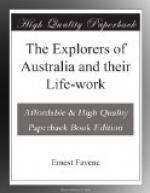Evans was born in England, at Warwick, in 1778. When a young man he went to the Cape of Good Hope, where he obtained an appointment in the dockyard, and while there he married his first wife, Janet Melvill. In 1802 he was appointed Deputy Surveyor-General, and came to Australia in H.M.S. Buffalo, in order to take up his official duties. It was while he held this post that he carried out his work of exploration.
When he returned from these explorations, he resumed his duties as Deputy Surveyor-General only, until he was permanently settled in Tasmania, where he remained in office until the year 1825, when he resigned in disgust at his treatment by his superiors.
Evans lived at a time when official jealousies were rife, and men in position often heedless of the justice or veracity of their statements when influenced by party rancour. The machinations of a cabal led by Governor Arthur, and an effort made to deprive him of his well-deserved pension, necessitated Evans’s departure for England to defend his claims. In this he was only partially successful, for the pension which it was understood was for life, was stopped in 1832. He returned to Tasmania, and passed the rest of his days at his residence, Warwick Lodge, at the head of Newtown Bay. He died at the age of seventy-four, and is buried in the old cemetery, Hobart; his second wife, Lucy Parris, rests in the same grave.
Evans was a clever draughtsman, and some of his sketches of the country explored are reproduced in Oxley’s journal. He also published a book entitled History and Description of the Present State of Van Diemen’s Land.
It was on Saturday, the 20th of November, 1813, that Evans, in charge of five men, one of whom had been with Blaxland’s party, started from the point of forest land on the Nepean known as Emu Island. He lost no time in following the tracks of the late expedition, leaving the measurement until his return. On Friday, the 26th, he reached Blaxland’s furthest point, and thenceforward passed over new ground. It is somewhat amusing to note that his opinions of the country when on his outward way and on his homeward, are widely divergent. He candidly and ingenuously writes, after he has been on the table-land:—
“What appeared to me fine country on my first coming to it, looks miserable now after returning from so superior and good a country.”
On Tuesday, the 30th of November, he gained a ridge that he had had in view for some time, though he had been “bothered” by the hills in his efforts to reach it. From this ridge he caught a tantalising view, a glimpse of the outskirts of the vast interior.




